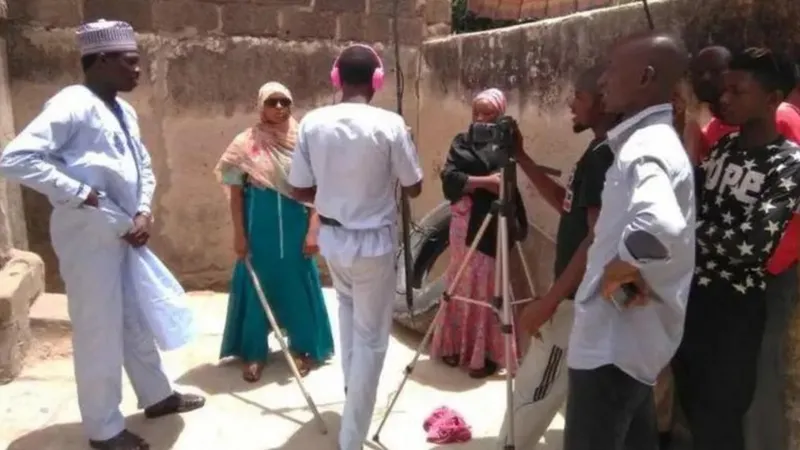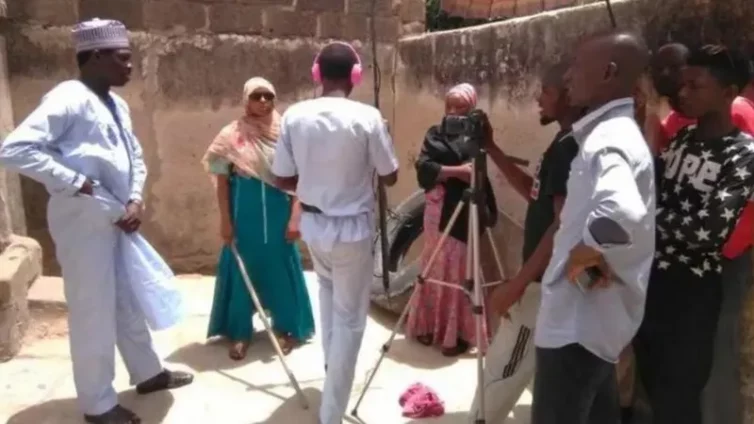Filmmakers in northern Nigeria's Kannywood movie industry have been told they risk a jail term if they portray violence in their work or have scenes with cross-dressers in them.
Kano state's censorship unit says it wants to protect society as films play a huge role in shaping behaviour.
The bans resulted from public complaints, it says.
There is rising concern about violent crime. The authorities also say cross-dressing is not part of local culture.
Kano's authorities are under pressure to deal with an increase in robberies committed by gangs.
"Whether we like it or not Kano has a thug problem and films contribute to it by their portrayals and it is where some learn how to go about it," said the censorship unit head, Abba al-Mustapha, in a video shared on social media.
Kano is one of the 12 mostly Muslim states in northern Nigeria which implement Islamic law, or Sharia alongside secular law.

Mr Mustapha said that cross-dressing, when men wear women's clothes or vice versa, was against local practices.
Such scenes are often included in films to inject an element of comedy.
He said directors who had already finished films that contained banned scenes had one month to make changes.
However, he said that films already in circulation would not have to be withdrawn.
"We can't control what has happened in the past but we can draw a line from now and make things better which we hope to do."
Film director, Aminu Mukhtar Umar told the BBC the bans might stifle creativity and freedom of expression which is the backbone of any movie industry.
"The better way to do this would've been to bring in experts on these issues to meet with Kannywood writers so that knowledge would be gained on how to go about it."
Mr Umar had issues with the censorship unit in 2022 for his film Makaranta, which was deemed immoral.
It was a film about sex education and also tackled issues like female genital mutilation.
Kannywood, which really took off in the 1990s, is inspired by India's Bollywood films, which explains the affection for songs and dance in the majority of its films.
It is based in Kano, hence the name. Although not all films are made in the state, it is by far the main market so even those films produced elsewhere would have to comply with Kano state regulations.
Kannywood plays second fiddle to southern Nigeria's more glamorous Nollywood scene, which is better known globally.
However, it still produces hundreds of films each year, which are also popular in countries where there is a Hausa-speaking population such as Ghana, Cameroon and Niger.
In order to comply with Sharia, male and female actors are not allowed to touch each other even if they are portraying a husband and wife.
Latest Stories
-
Mothers celebrate arrival of Christmas Day babies at Ridge Hospital
2 hours -
Alleged National Security operative remanded over GH₵1m recruitment scam
2 hours -
Sametro Group of Companies donates to widows in Tarkwa Nsuaem Municipality to mark Christmas
3 hours -
Morocco’s Family Code revision proposals unveiled in Rabat
4 hours -
Saglemi fire: No documents lost, redevelopment project unaffected – Oppong Nkrumah
4 hours -
WAEC uncertain about meeting Dec. 29 deadline for WASSCE results
5 hours -
‘She Leads Project’ calls for more female representation in politics to address women’s issues
5 hours -
DJ Promise crowned Best Radio DJ at Dangme Music Awards 2024
5 hours -
Re-collation: Court sets Dec. 27 to hear NDC’s suit against EC
5 hours -
Let’s remain positive, optimistic, and with calmness, rebrand our party – Afenyo-Markin
6 hours -
L’aîné HR celebrates 30 years of excellence in HR management in Ghana
6 hours -
Corporate Wellness: Elegant Homes emphasizes impact of Annual Health and Family Fun Day
7 hours -
BoG issues bancassurance directives to stakeholders in financial sector; warns of sanctions
7 hours -
African Paralympic Committee President sends festive greetings to fraternity
8 hours -
Ghana-Russia Centre holds its first corporate social responsibility event in Ghana
8 hours

